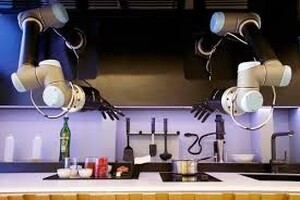
Like John Torode and Gregg Wallace at the end of an invention test, Moley Robotics wants you to stop cooking. The UK company has unveiled what it claims is the world’s first robot chef at the Hanover Messe robotics fair in Germany.
The chef – more of an automated kitchen side – comprises two robotic arms above a large cooking surface, including hobs, a sink, and an oven, hidden behind a glass safety screen. The company worked with London-based Shadow Robotics, which has worked on robot projects for Nasa, to give the system hands intricate enough, it says, to crack an egg. Rather than cooking from a recipe, the system relies on capturing the movements of a human chef with a 3D camera, then recreating their every stir.
WIRED got a sneak peak (and a taste test) of the kitchen at a location in East London before the launch. For the demonstration, Mobey captured the movements of 2011 Masterchef champion Tim Anderson as he made a crab bisque. "I thought it would be lucky if we could get it to make a piece of toast," says Anderson.
Could This Robot Chef Change The Future Of Cooking?
The movements are uncanny: the robot turns on the hob with a deft finger, before picking up some butter taken from a group of pre-assembled ingredients. It quickly melts the butter, adds shallots and seasoning, and over the next twenty or so minutes produces an impressive bisque. It even plates up the dish, spooning the soup into a bowl before adding tarragon and a few drops of chilli oil. "A quick wipe of the bowl and I would be happy to send that out," Anderson says. The bisque is delicious: deep and warming, with a strong hit of crab (although a food critic might note that’s less down to the robot than Anderson’s instructions).

The robot is currently limited to one recipe, but the company hopes to have built a digital library of 2,000 dishes by launch in 2017. Eventually it hopes to allow chefs and home users to record and contribute their favourite recipes. "The stirring motion opens up baking. If it can stir butter, it could be whisking," says Anderson. "It’s a question of training," says Mobey’s Russian founder, roboticist Mark Oleynik. "It has enough motors and sensors to make anything." (By launch, he suggests, this will also include the ability to do the dishes afterwards.)
The company claims it the product will be on the market for in 2017, and estimates it will cost around
Kommentare
![]()
